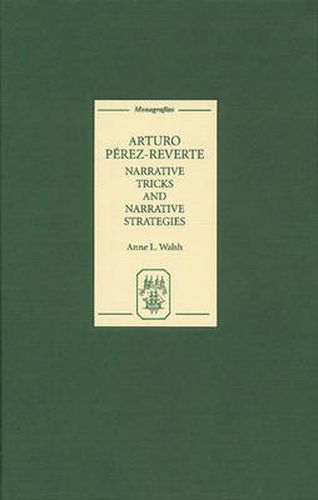Readings Newsletter
Become a Readings Member to make your shopping experience even easier.
Sign in or sign up for free!
You’re not far away from qualifying for FREE standard shipping within Australia
You’ve qualified for FREE standard shipping within Australia
The cart is loading…






The writings of Arturo Perez-Reverte, one of Spain’s most renowned contemporary authors, have been described as a minefield. This monograph examines the complexities behind the narrative technique employed in creating such a minefield, including an analysis of the role played by both male and female characters, the relevance of the past as a motif, and aspects of the role of storytelling in creating mystery where none should exist. Both Revertian novelsand journalistic writing are seen to be part of an over-all game which is played between their author and his readers. Film, too, forms part of the material reviewed as, though Perez-Reverte is not a script writer, many films have been based on his novels.
The text-centred analysis concludes that the themes of interest in all Revertian output revolve around two main areas: the significance of the past, whether historical, cultural, or literary, andthe role of the written word in communicating, in rescuing and in challenging versions of that past in order to combat what Perez-Reverte terms ‘dismemory’.
ANNE L. WALSH lectures in Hispanic Studies at University College, Cork.
$9.00 standard shipping within Australia
FREE standard shipping within Australia for orders over $100.00
Express & International shipping calculated at checkout
The writings of Arturo Perez-Reverte, one of Spain’s most renowned contemporary authors, have been described as a minefield. This monograph examines the complexities behind the narrative technique employed in creating such a minefield, including an analysis of the role played by both male and female characters, the relevance of the past as a motif, and aspects of the role of storytelling in creating mystery where none should exist. Both Revertian novelsand journalistic writing are seen to be part of an over-all game which is played between their author and his readers. Film, too, forms part of the material reviewed as, though Perez-Reverte is not a script writer, many films have been based on his novels.
The text-centred analysis concludes that the themes of interest in all Revertian output revolve around two main areas: the significance of the past, whether historical, cultural, or literary, andthe role of the written word in communicating, in rescuing and in challenging versions of that past in order to combat what Perez-Reverte terms ‘dismemory’.
ANNE L. WALSH lectures in Hispanic Studies at University College, Cork.